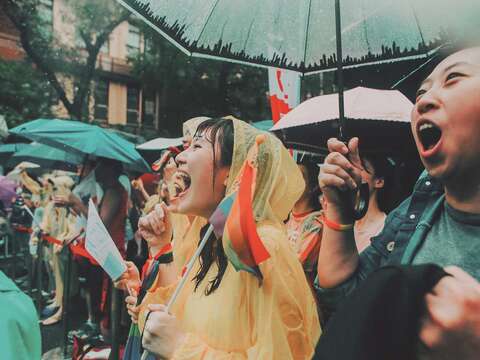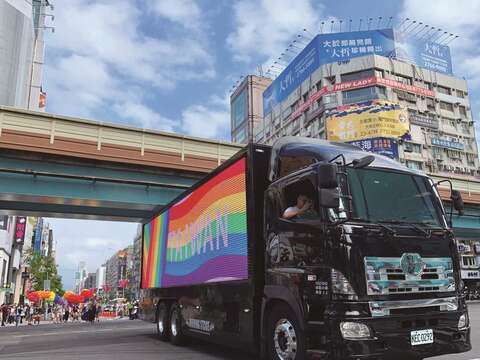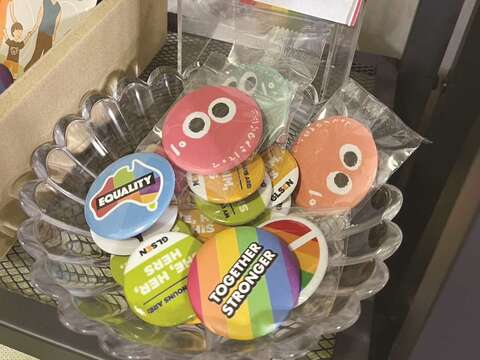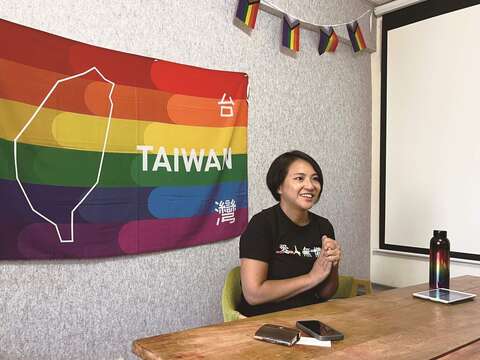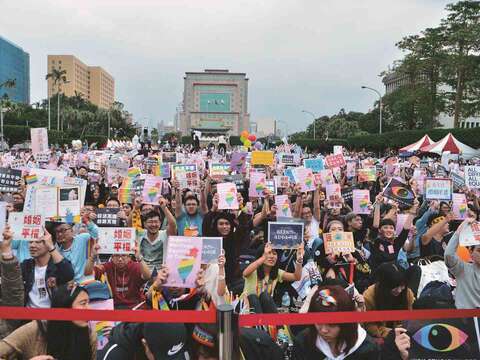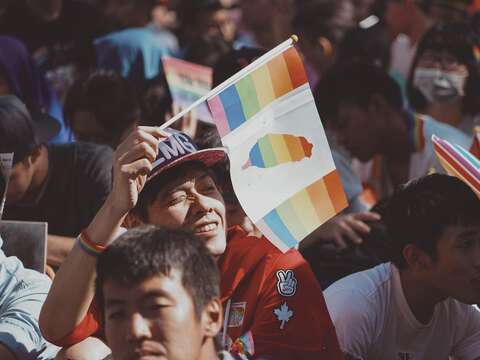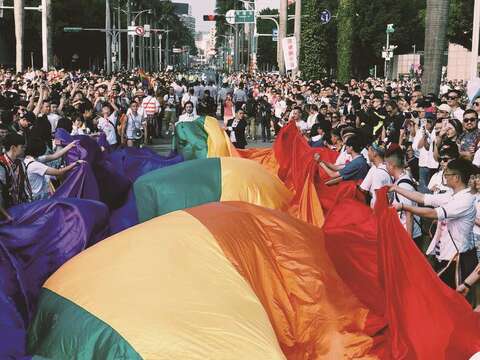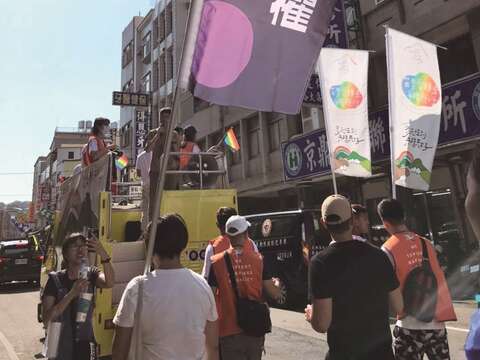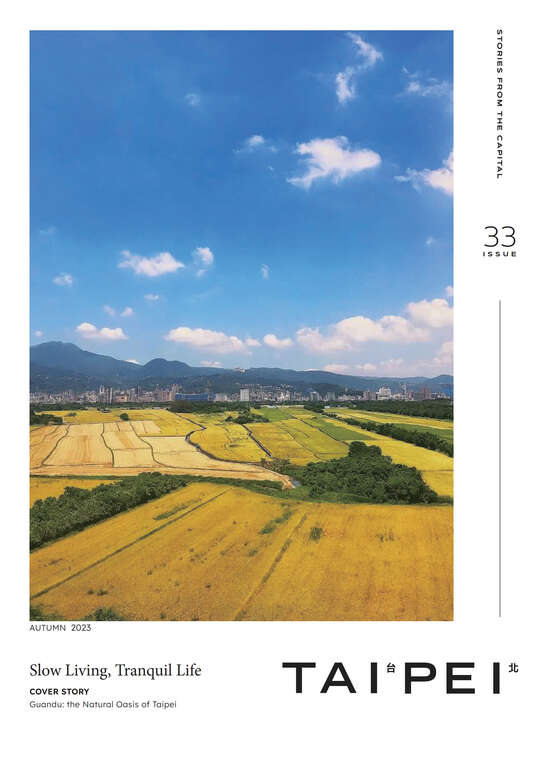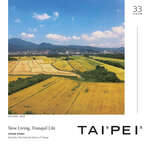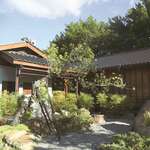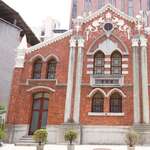Post date:2023-09-11
815
TAIPEI #33 (2023 Autumn)
The Taiwan Equality Campaign — A Proud Pride Trailblazer
Author Rick Charette
Photographer Taiwan Equality Campaign, Kerstin Hsu, Chieh-Li Yen
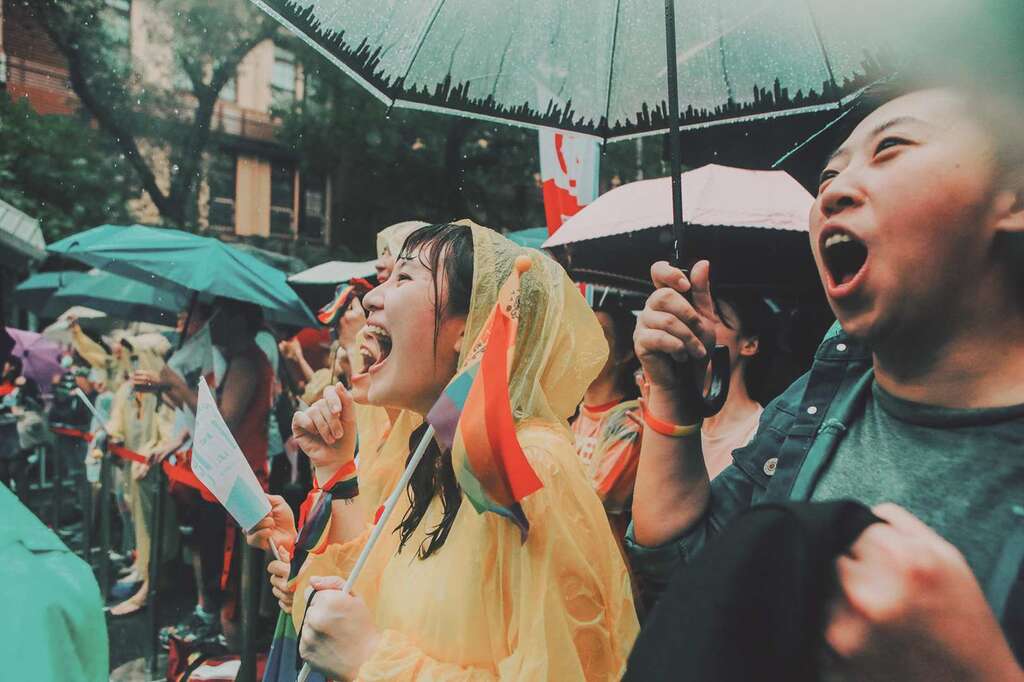 ▲The historical moment when same-sex marriage law was passed, as activists chanting passionately in the rain.
▲The historical moment when same-sex marriage law was passed, as activists chanting passionately in the rain.
In May 2019, Taiwan became the first country in Asia to legalize same-sex marriage, and in May of this year the Legislative Yuan, the national government’s legislative assembly, granted same-sex couples the right to jointly adopt a child neither are related to. These are milestones in the history of LGBT+ rights in Taiwan, demonstrating the diversity and inclusivity of Taiwanese society and serving as a model for the rest of its neighboring countries.
Iconic in this equal-rights movement has been the Taiwan LGBT+ Pride, staged annually in late October in Taipei. This year, it is held on October 28th. Being East Asia’s largest pride parade, this spectacular happening has achieved high visibility well beyond the region’s shores, attracting participation by gay groups and social activists from around the globe. First staged 20 years ago, in 2003, this year’s edition has epochal significance.
For the last several years, at the forefront of the local LGBT+ rights movement has been the non-governmental organization Taiwan Equality Campaign (彩虹平權大平台,TEC) founded in 2016.
Motivation and Goals
Today, the organization’s goal is to “make an LGBT-friendly environment a part of everyday life,” says Executive Director Joyce Teng (鄧筑媛). In the beginning the NGO was called the Marriage Equality Coalition (婚姻平權大平台), advocating for marriage equality and “promoting diverse narratives of love.” In 2020, after the same-sex marriage legalization in Taiwan, “We realized there was still much more work beyond this, so we transformed into the TEC, and expanded our goals to include elimination of all forms of gender inequality and realization of an even more diverse and inclusive Taiwan.”
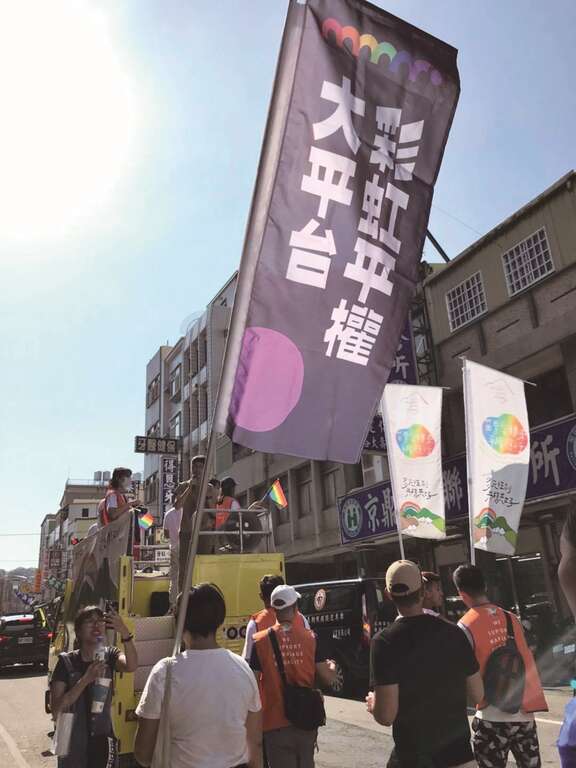 ▲Taiwan Equality Campaign marches in the Taiwan LGBT+ Pride on the streets of Taipei.
▲Taiwan Equality Campaign marches in the Taiwan LGBT+ Pride on the streets of Taipei.
Biggest Challenges and Most Moving Milestones
Both the NGO’s most daunting obstacles and the most satisfying achievements can be addressed in one overarching answer, says Teng — “They’ve both been intrinsic parts of the same process of evolution.” Early on, she says, the NGO would stage events and the general public would at times show little interest, which disturbed and deeply saddened her and other campaigners.
“Despite these setbacks, we had to take a positive view. Taiwan is in general a very open and accepting society, and the apathy we saw was just that the subject of LGBT+ rights was an ‘invisible’ issue — simply not part of the general public’s daily reality, not on their radar. And it was our job to make this so.”
Over the years, being immersed deep in the struggle, progress has often seemed maddeningly, glacially slow. “But look back from where we are here in 2023,” she says, smiling, “you can feel that the strides made in such a short span of time have been remarkable. We’re turning this society around. In 2019, same-sex marriage was allowed. In January this year, same sex transnational marriage was allowed between Taiwan citizens and those of all other countries, China excepted. And in May, allowance of joint adoption by same-sex married couples of children neither spouse is related to passed.”
Previously, under the same-sex marriage special law, married spouses could only adopt each other’s biological children. In contrast to heterosexual couples, same-sex spouses had no right to apply for other adoptions, nor could they adopt each other’s adopted children.
Asia as a whole has always been very conservative regarding LGBT+ rights, Teng adds, and the public’s attitudes have traveled light years in, historically speaking, the blink of an eye. Much more people today support LGBT+ equality and recognition, and the subject has increasingly become part of everyday consciousness and conversation. “Increasingly,” says Teng, “but not automatic.”
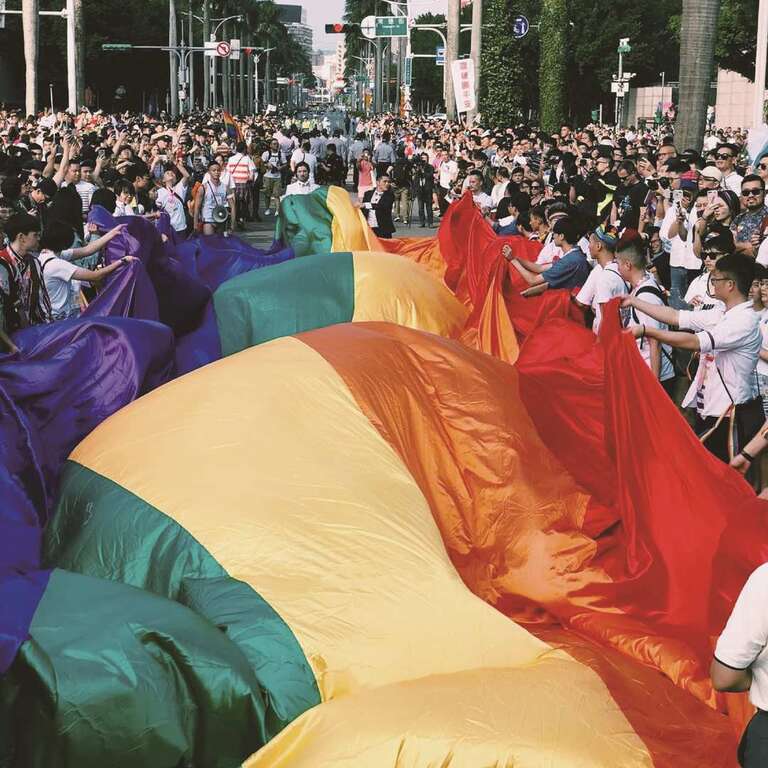 ▲The Taiwan LGBT+ Pride held every October attracts tens of thousands of participants.
▲The Taiwan LGBT+ Pride held every October attracts tens of thousands of participants.
Changing Social Attitudes, Changed Campaigning & The TEC’s Path to the Future
Teng states that another, more recent setback faced is social attitude “slippage” or “backsliding.” The TEC has conducted a Social Attitudes Survey each spring since the 2019 same-sex marriage milestone. Until this year, public support for such issues as whether same-sex couples can marry and raise children has continued to grow, and general acceptance of the LGBT+ community has also been increasing. But this year, overall friendliness and support declined slightly, and the ratio of non-support or active opposition increased.
Among the wide range of categories seeing slippage of a few percentage points were acceptance of one’s children, relatives, bosses or teachers, fellow students or colleagues, top government officials, and councilors or lawmakers being homosexual.
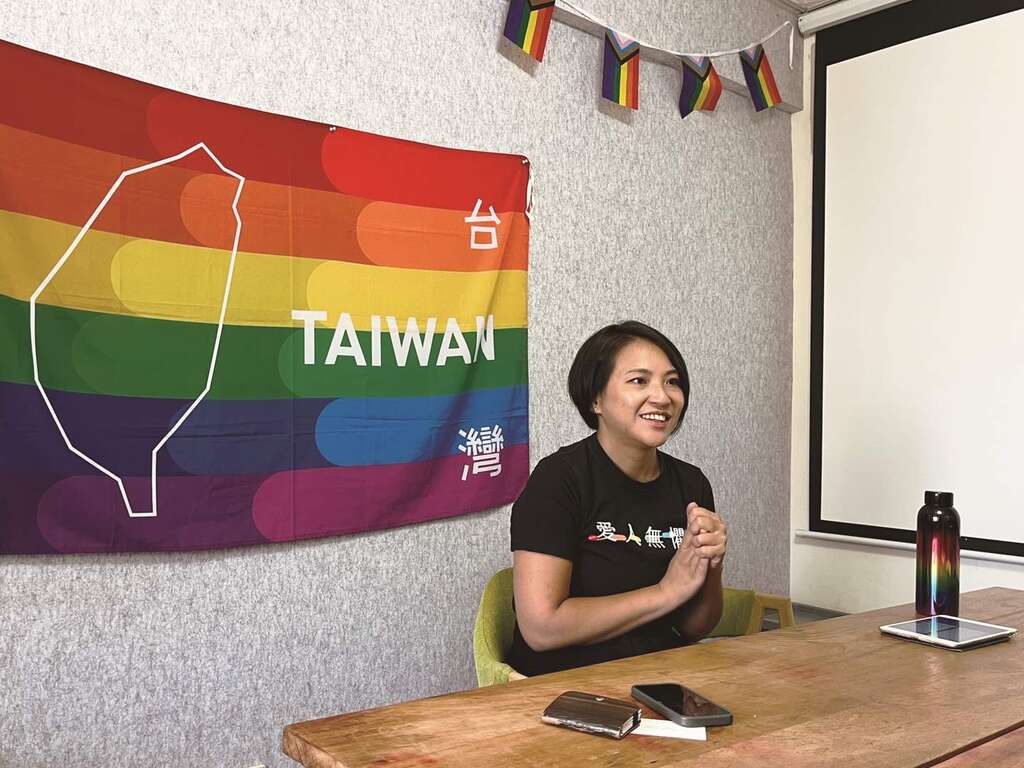 ▲Taiwan Equality Campaign Executive Director Joyce Teng shares her personal journey in fighting for LGBT+ rights. (Photo・Chieh-Li Yen)
▲Taiwan Equality Campaign Executive Director Joyce Teng shares her personal journey in fighting for LGBT+ rights. (Photo・Chieh-Li Yen)
Teng replies that a positive within these negative results is that overall public support remains well above 50 percent. “A key issue here is that when you present the concept of LGBT+ rights and fairness to young-generation members, they understand the moral rationale and most permanently modify their values. But we’ve found this year that the new attitudes have not become second nature for the generations above, who grew up in a world of different accepted beliefs, and there has been slippage. It’s thus up to the TEC and other groups to work harder to keep these issues at the forefront, increasing both the breadth and depth of our social education and communication. And as the current young generation ages, the ‘second-nature’ attitudes will spread more widely and take deeper root. In terms of campaigning, we have to make the open presence of LGBT+ community members in every corner of everyday life a normal, accepted thing, not something seen as special.”
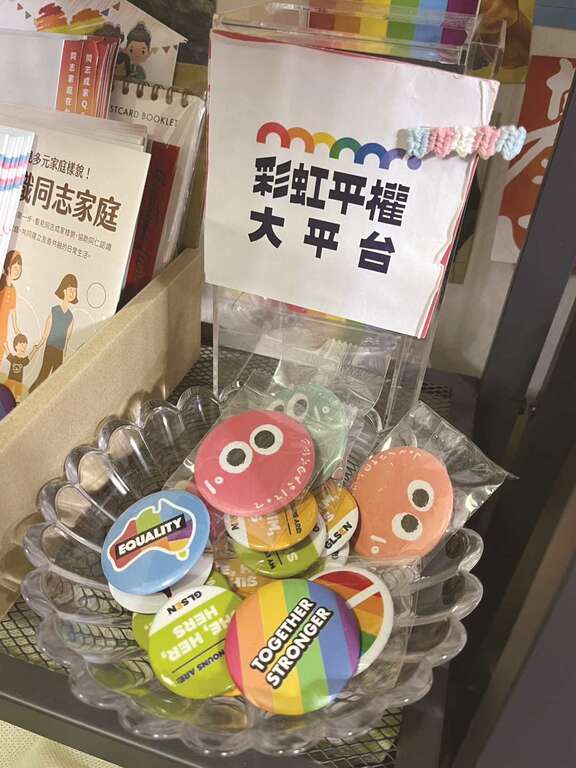 ▲Custom-made pins by TEC. (Photo・Kerstin Hsu)
▲Custom-made pins by TEC. (Photo・Kerstin Hsu)
Thus, the key overarching TEC campaign focus is now to move Taiwan society beyond “From setting us apart as a ‘special’ community — my‘gay’family member,‘gay’colleague,‘gay’ customers,‘gay’elected representative — to simply engaging with us as‘my’family member, colleague, customers, representative,”Teng adds. The TEC is busy in a comprehensive range of activities in pursuit of this objective.
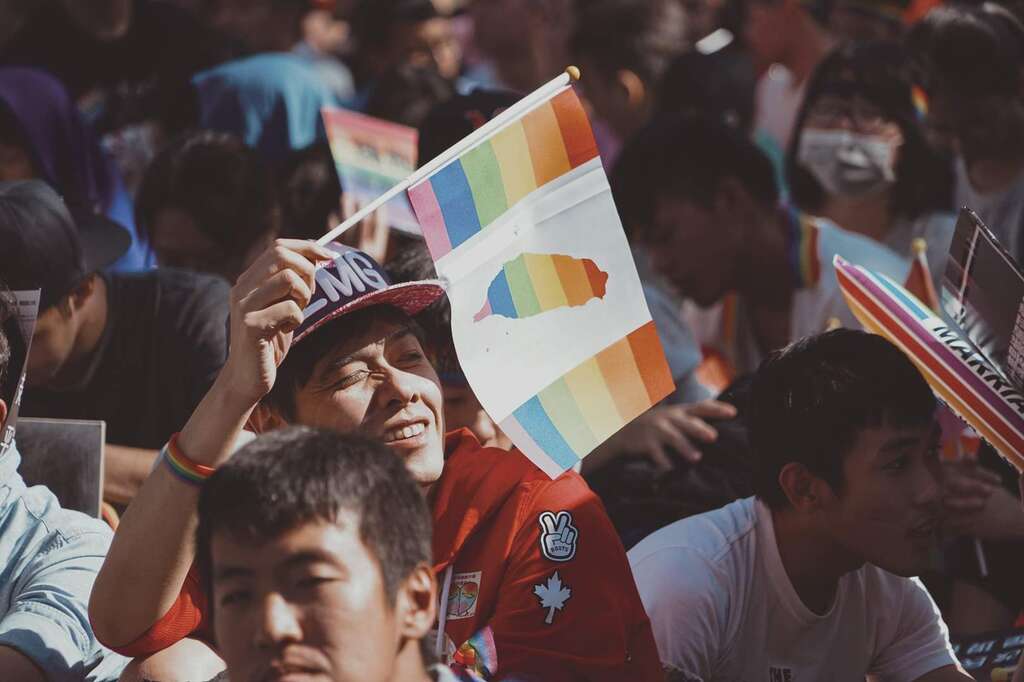 ▲The bright sunlight shines on the Taiwan rainbow flag during the Pride.
▲The bright sunlight shines on the Taiwan rainbow flag during the Pride.
For example, on the larger scale,“In terms of policy advocacy, we’re pushing for equal rights to assisted reproductive technologies, now restricted to hetero-married spouses,”Teng goes on.“In terms of political participation, we’re encouraging more out-of-the-closet candidates to run for office and encouraging more government officials to come out. Right now, out of the 11,000 or so top positions, only three individuals are openly LGBT+.”
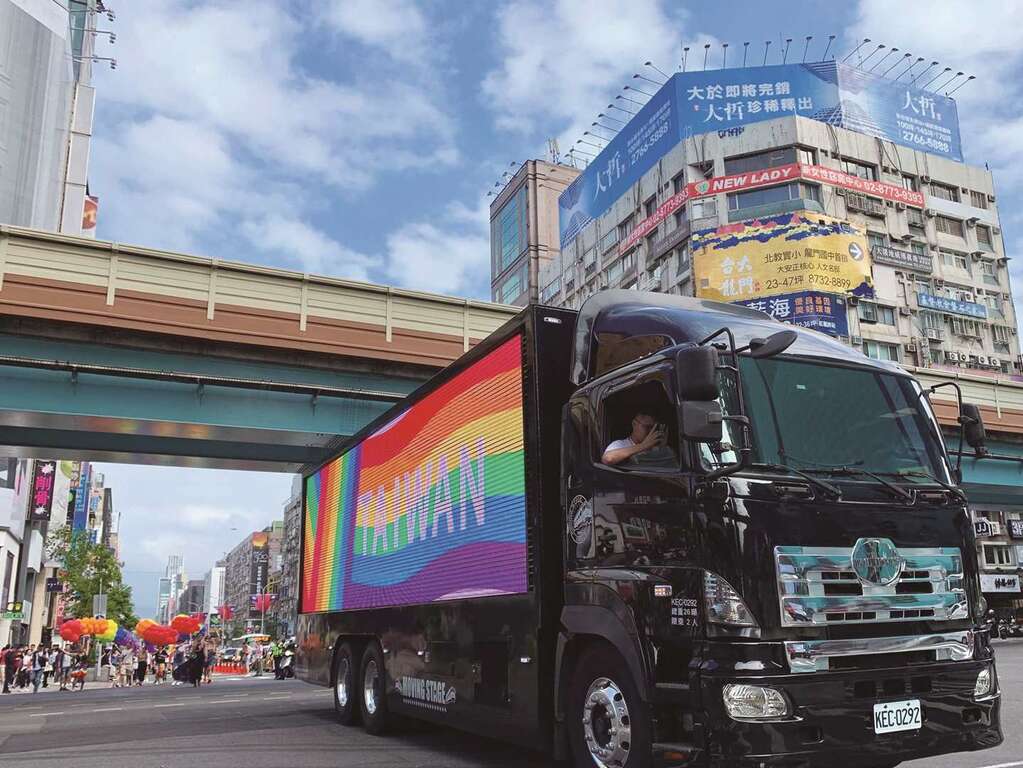 ▲A Pride Parade mobile ad vehicle passes through Taipei’s eastern district.
▲A Pride Parade mobile ad vehicle passes through Taipei’s eastern district.
And on the smaller scale, says Teng, “In terms of social education, we train volunteers to conduct interaction to enhance understanding of the LGBT+ community. We ask businesses that want to identify as friendly if we can send trainers to teach staff how to comfortably deal with LGBT+ patrons. And we’ve done things like design heart-shaped signs with rainbow colors that businesses can post to indicate they are friendly, and designed stickers our community members can use on their health cards to let medical personnel know how they prefer to be addressed — Mr., Ms., by name only, etc. — to help put both sides at ease.”
All these things help in the slow process of“normalizing LGBT-friendly norms.”
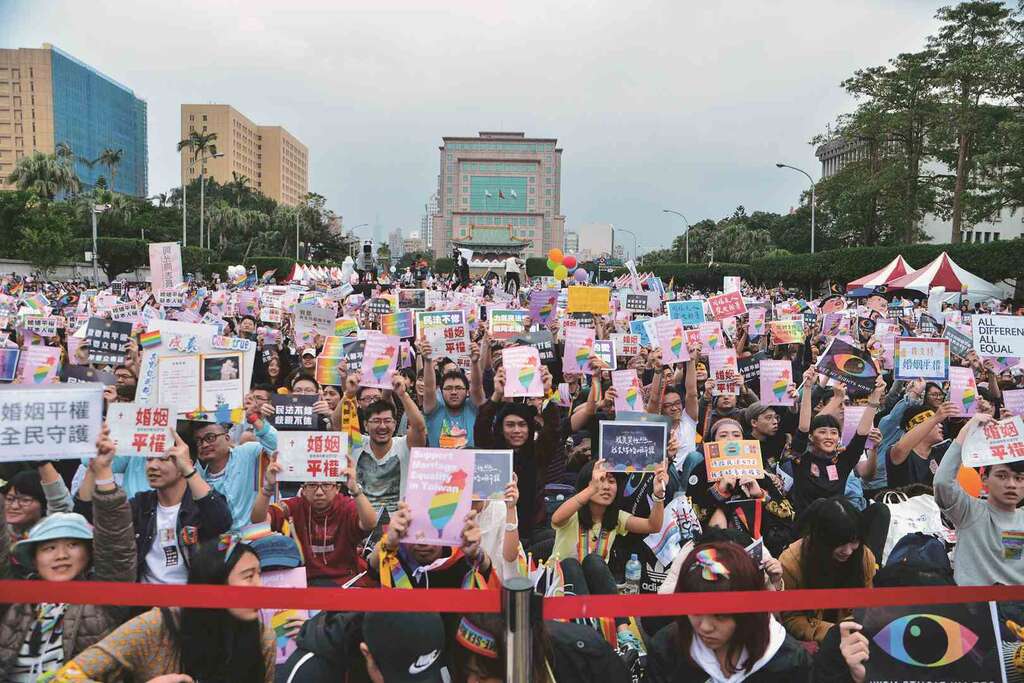 ▲Advocates firmly state their position for equality in front of the Presidential Office Building.
▲Advocates firmly state their position for equality in front of the Presidential Office Building.
Recommended LGBT+ Resources
If planning to visit or already in Taipei, a good launch point should you wish to learn more about the LGBT+ scene is the Travel by Rainbow section on the city government’s Taipei Travel Net (travel.taipei). This introduces an array of tourist attractions with significance in regard to LGBT+ issues and history. Examples include 228 Peace Park (二二八和平紀念公園), where the gate is painted in the rainbow flag colors, and the Presidential Office Building facing Ketagalan Boulevard (凱達格蘭大道), a key venue for human rights demonstrations. The section also has an“LGBT friendly spaces” link button.
As well, visit the city’s Taipei Friendly Store site (friendlystore.taipei), where you can search for friendly businesses in various categories: gender-friendly, English-friendly, Muslim-friendly, etc.
“In October the city also arranges special Rainbow Sightseeing Bus Tours,”says Teng,“as part of the annual Color Taipei series of activities that lead up to the Taiwan LGBT+ Pride parade. The goal of Color Taipei is to bolster the city’s rainbow tourism and commerce; the bus tours are great fun, with drag queens serving as hosts.” Day tours are focused on relevant historic sites and milestones, night tours on the LGBT+ bar/nightclub scene.
The city is today filled with stores, bars, nightclubs, etc. that are LGBT-friendly, so choices are wide rather than restricted, says Teng. However, she specifically recommends The Red House (西門紅樓) in the Ximending (西門町) area. The large South Square (南廣場) at The Red House, an important heritage-architecture complex, is filled with gay bars and shops, with alfresco seating. The surrounding area also brims with LGBT-friendly retail and entertainment establishments.“The South Square vibe is so safe, relaxed, and inviting,”she says,“that I’ve even heard from straight folk, couples and singles, that they go there because nobody will hassle them. The late-night drag shows on weekends are especially popular.”
Also, says Teng, indie bookstores are especially friendly. The GinGin Store (晶晶書庫) in the city’s south is an LGBT+ community spiritual symbol opened in 1999 as Asia’s first dedicated composite culture shop, selling LGBT+ publications and products while from time to time staging exhibits and other cultural-arts events.
Beyond the services provided by her own organization, Teng also specially cites those of the Taiwan Tongzhi (LGBTQ+) Hotline Association (台灣同志諮詢熱線協會), Taiwan’s largest and oldest community counseling and support group founded in 1998. Among its many accomplishments, this is the group that started the beloved Taiwan LGBT+ Pride, a parade no visitors should miss.
The Taiwan Equality Campaign — A Proud Pride Trailblazer
Author Rick Charette
Photographer Taiwan Equality Campaign, Kerstin Hsu, Chieh-Li Yen
 ▲The historical moment when same-sex marriage law was passed, as activists chanting passionately in the rain.
▲The historical moment when same-sex marriage law was passed, as activists chanting passionately in the rain. In May 2019, Taiwan became the first country in Asia to legalize same-sex marriage, and in May of this year the Legislative Yuan, the national government’s legislative assembly, granted same-sex couples the right to jointly adopt a child neither are related to. These are milestones in the history of LGBT+ rights in Taiwan, demonstrating the diversity and inclusivity of Taiwanese society and serving as a model for the rest of its neighboring countries.
Iconic in this equal-rights movement has been the Taiwan LGBT+ Pride, staged annually in late October in Taipei. This year, it is held on October 28th. Being East Asia’s largest pride parade, this spectacular happening has achieved high visibility well beyond the region’s shores, attracting participation by gay groups and social activists from around the globe. First staged 20 years ago, in 2003, this year’s edition has epochal significance.
For the last several years, at the forefront of the local LGBT+ rights movement has been the non-governmental organization Taiwan Equality Campaign (彩虹平權大平台,TEC) founded in 2016.
Motivation and Goals
Today, the organization’s goal is to “make an LGBT-friendly environment a part of everyday life,” says Executive Director Joyce Teng (鄧筑媛). In the beginning the NGO was called the Marriage Equality Coalition (婚姻平權大平台), advocating for marriage equality and “promoting diverse narratives of love.” In 2020, after the same-sex marriage legalization in Taiwan, “We realized there was still much more work beyond this, so we transformed into the TEC, and expanded our goals to include elimination of all forms of gender inequality and realization of an even more diverse and inclusive Taiwan.”
 ▲Taiwan Equality Campaign marches in the Taiwan LGBT+ Pride on the streets of Taipei.
▲Taiwan Equality Campaign marches in the Taiwan LGBT+ Pride on the streets of Taipei. Biggest Challenges and Most Moving Milestones
Both the NGO’s most daunting obstacles and the most satisfying achievements can be addressed in one overarching answer, says Teng — “They’ve both been intrinsic parts of the same process of evolution.” Early on, she says, the NGO would stage events and the general public would at times show little interest, which disturbed and deeply saddened her and other campaigners.
“Despite these setbacks, we had to take a positive view. Taiwan is in general a very open and accepting society, and the apathy we saw was just that the subject of LGBT+ rights was an ‘invisible’ issue — simply not part of the general public’s daily reality, not on their radar. And it was our job to make this so.”
Over the years, being immersed deep in the struggle, progress has often seemed maddeningly, glacially slow. “But look back from where we are here in 2023,” she says, smiling, “you can feel that the strides made in such a short span of time have been remarkable. We’re turning this society around. In 2019, same-sex marriage was allowed. In January this year, same sex transnational marriage was allowed between Taiwan citizens and those of all other countries, China excepted. And in May, allowance of joint adoption by same-sex married couples of children neither spouse is related to passed.”
Previously, under the same-sex marriage special law, married spouses could only adopt each other’s biological children. In contrast to heterosexual couples, same-sex spouses had no right to apply for other adoptions, nor could they adopt each other’s adopted children.
Asia as a whole has always been very conservative regarding LGBT+ rights, Teng adds, and the public’s attitudes have traveled light years in, historically speaking, the blink of an eye. Much more people today support LGBT+ equality and recognition, and the subject has increasingly become part of everyday consciousness and conversation. “Increasingly,” says Teng, “but not automatic.”
 ▲The Taiwan LGBT+ Pride held every October attracts tens of thousands of participants.
▲The Taiwan LGBT+ Pride held every October attracts tens of thousands of participants.Changing Social Attitudes, Changed Campaigning & The TEC’s Path to the Future
Teng states that another, more recent setback faced is social attitude “slippage” or “backsliding.” The TEC has conducted a Social Attitudes Survey each spring since the 2019 same-sex marriage milestone. Until this year, public support for such issues as whether same-sex couples can marry and raise children has continued to grow, and general acceptance of the LGBT+ community has also been increasing. But this year, overall friendliness and support declined slightly, and the ratio of non-support or active opposition increased.
Among the wide range of categories seeing slippage of a few percentage points were acceptance of one’s children, relatives, bosses or teachers, fellow students or colleagues, top government officials, and councilors or lawmakers being homosexual.
 ▲Taiwan Equality Campaign Executive Director Joyce Teng shares her personal journey in fighting for LGBT+ rights. (Photo・Chieh-Li Yen)
▲Taiwan Equality Campaign Executive Director Joyce Teng shares her personal journey in fighting for LGBT+ rights. (Photo・Chieh-Li Yen)Teng replies that a positive within these negative results is that overall public support remains well above 50 percent. “A key issue here is that when you present the concept of LGBT+ rights and fairness to young-generation members, they understand the moral rationale and most permanently modify their values. But we’ve found this year that the new attitudes have not become second nature for the generations above, who grew up in a world of different accepted beliefs, and there has been slippage. It’s thus up to the TEC and other groups to work harder to keep these issues at the forefront, increasing both the breadth and depth of our social education and communication. And as the current young generation ages, the ‘second-nature’ attitudes will spread more widely and take deeper root. In terms of campaigning, we have to make the open presence of LGBT+ community members in every corner of everyday life a normal, accepted thing, not something seen as special.”
 ▲Custom-made pins by TEC. (Photo・Kerstin Hsu)
▲Custom-made pins by TEC. (Photo・Kerstin Hsu)Thus, the key overarching TEC campaign focus is now to move Taiwan society beyond “From setting us apart as a ‘special’ community — my‘gay’family member,‘gay’colleague,‘gay’ customers,‘gay’elected representative — to simply engaging with us as‘my’family member, colleague, customers, representative,”Teng adds. The TEC is busy in a comprehensive range of activities in pursuit of this objective.
 ▲The bright sunlight shines on the Taiwan rainbow flag during the Pride.
▲The bright sunlight shines on the Taiwan rainbow flag during the Pride. For example, on the larger scale,“In terms of policy advocacy, we’re pushing for equal rights to assisted reproductive technologies, now restricted to hetero-married spouses,”Teng goes on.“In terms of political participation, we’re encouraging more out-of-the-closet candidates to run for office and encouraging more government officials to come out. Right now, out of the 11,000 or so top positions, only three individuals are openly LGBT+.”
 ▲A Pride Parade mobile ad vehicle passes through Taipei’s eastern district.
▲A Pride Parade mobile ad vehicle passes through Taipei’s eastern district.And on the smaller scale, says Teng, “In terms of social education, we train volunteers to conduct interaction to enhance understanding of the LGBT+ community. We ask businesses that want to identify as friendly if we can send trainers to teach staff how to comfortably deal with LGBT+ patrons. And we’ve done things like design heart-shaped signs with rainbow colors that businesses can post to indicate they are friendly, and designed stickers our community members can use on their health cards to let medical personnel know how they prefer to be addressed — Mr., Ms., by name only, etc. — to help put both sides at ease.”
All these things help in the slow process of“normalizing LGBT-friendly norms.”
 ▲Advocates firmly state their position for equality in front of the Presidential Office Building.
▲Advocates firmly state their position for equality in front of the Presidential Office Building.Recommended LGBT+ Resources
If planning to visit or already in Taipei, a good launch point should you wish to learn more about the LGBT+ scene is the Travel by Rainbow section on the city government’s Taipei Travel Net (travel.taipei). This introduces an array of tourist attractions with significance in regard to LGBT+ issues and history. Examples include 228 Peace Park (二二八和平紀念公園), where the gate is painted in the rainbow flag colors, and the Presidential Office Building facing Ketagalan Boulevard (凱達格蘭大道), a key venue for human rights demonstrations. The section also has an“LGBT friendly spaces” link button.
As well, visit the city’s Taipei Friendly Store site (friendlystore.taipei), where you can search for friendly businesses in various categories: gender-friendly, English-friendly, Muslim-friendly, etc.
“In October the city also arranges special Rainbow Sightseeing Bus Tours,”says Teng,“as part of the annual Color Taipei series of activities that lead up to the Taiwan LGBT+ Pride parade. The goal of Color Taipei is to bolster the city’s rainbow tourism and commerce; the bus tours are great fun, with drag queens serving as hosts.” Day tours are focused on relevant historic sites and milestones, night tours on the LGBT+ bar/nightclub scene.
The city is today filled with stores, bars, nightclubs, etc. that are LGBT-friendly, so choices are wide rather than restricted, says Teng. However, she specifically recommends The Red House (西門紅樓) in the Ximending (西門町) area. The large South Square (南廣場) at The Red House, an important heritage-architecture complex, is filled with gay bars and shops, with alfresco seating. The surrounding area also brims with LGBT-friendly retail and entertainment establishments.“The South Square vibe is so safe, relaxed, and inviting,”she says,“that I’ve even heard from straight folk, couples and singles, that they go there because nobody will hassle them. The late-night drag shows on weekends are especially popular.”
Also, says Teng, indie bookstores are especially friendly. The GinGin Store (晶晶書庫) in the city’s south is an LGBT+ community spiritual symbol opened in 1999 as Asia’s first dedicated composite culture shop, selling LGBT+ publications and products while from time to time staging exhibits and other cultural-arts events.
Beyond the services provided by her own organization, Teng also specially cites those of the Taiwan Tongzhi (LGBTQ+) Hotline Association (台灣同志諮詢熱線協會), Taiwan’s largest and oldest community counseling and support group founded in 1998. Among its many accomplishments, this is the group that started the beloved Taiwan LGBT+ Pride, a parade no visitors should miss.
Gallery
:::
Popular articles
 Guandu: the Natural Oasis of Taipei (TAIPEI Quarterly 2023 Autumn Vol.33)
Guandu: the Natural Oasis of Taipei (TAIPEI Quarterly 2023 Autumn Vol.33) TAIPEI Quarterly 2023 Autumn Vol.33
TAIPEI Quarterly 2023 Autumn Vol.33 Eastern District + Xinyi District Taipei's East, Internationalized Gallery of Architectural Masterworks (TAIPEI Quarterly 2023 Autumn Vol.33)
Eastern District + Xinyi District Taipei's East, Internationalized Gallery of Architectural Masterworks (TAIPEI Quarterly 2023 Autumn Vol.33) Guting: Leisure in Southern Taipei (TAIPEI Quarterly 2023 Autumn Vol.33)
Guting: Leisure in Southern Taipei (TAIPEI Quarterly 2023 Autumn Vol.33) The Beauty of Sacred Spaces ― A Taipei Church Tour (TAIPEI Quarterly 2023 Autumn Vol.33)
The Beauty of Sacred Spaces ― A Taipei Church Tour (TAIPEI Quarterly 2023 Autumn Vol.33) Tracing Taipei's Calligraphy Then and Now: Chu Chen-Nan's Artistic Journey and Insights (TAIPEI Quarterly 2023 Autumn Vol.33)
Tracing Taipei's Calligraphy Then and Now: Chu Chen-Nan's Artistic Journey and Insights (TAIPEI Quarterly 2023 Autumn Vol.33)
 The Taiwan Equality Campaign ― A Proud Pride Trailblazer (TAIPEI Quarterly 2023 Autumn Vol.33)
The Taiwan Equality Campaign ― A Proud Pride Trailblazer (TAIPEI Quarterly 2023 Autumn Vol.33)